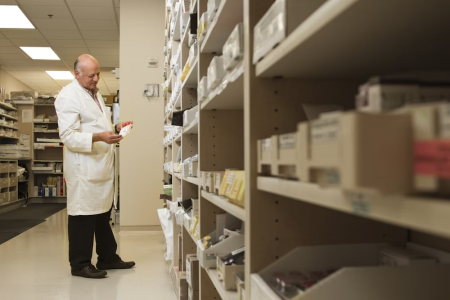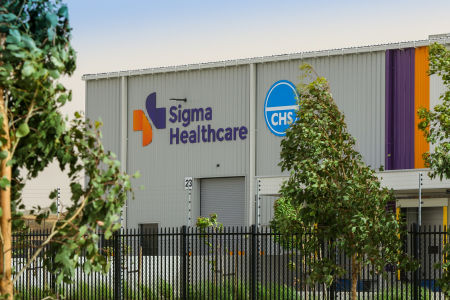This $8.8 billion union may affect pharmacy retailing, ACCC reports
By
Gian T
- Replies 24
Affordable medicine and healthcare are essential aspects of everyday life, impacting individuals and communities alike.
However, recent trends of companies merging or acquiring smaller firms in the healthcare sector have raised concerns.
These consolidations can sometimes lead to monopolies, reducing competition and potentially driving up prices for medications and medical services.
The Australian Competition and Consumer Commission (ACCC) waved a cautionary flag regarding the proposed $8.8 billion merger between Sigma Healthcare and Chemist Warehouse.
This move could significantly reshape the landscape of Australia's pharmacy sector.
Combining Australia's largest pharmacy chain with a major wholesaler, this union sparked concerns about potential impacts on the overall consumer experience in pharmacies.
After a three-month review, the ACCC's preliminary report suggests that the merger could hinder new entrants into the pharmacy market.
The watchdog was worried that the merger could have diluted the competitive tension between Chemist Warehouse and Sigma stores, potentially leading to higher customer prices.
‘This is a major structural change for the pharmacy sector, involving the largest pharmacy chain by revenue merging with a key wholesaler to thousands of independent pharmacies that in turn compete against Chemist Warehouse,’ Commissioner Stephen Ridgeway explained.
‘We have identified a range of preliminary competition concerns, including at the retail level and as a result of the proposed integration of the merged firm across the wholesale and retail level. We want to hear from interested parties, including rival pharmacies, as we continue this review.’
Sigma's stock price dropped nearly 10 per cent to $1.08 in the initial minutes of trading after the ACCC's announcement.
However, losses were mitigated later in the session, though the shares still closed down by 4.2 per cent at $1.15.
The company informed investors that the ACCC's ‘statement of issues’ did not come as a surprise, considering the complexities associated with integrating two large businesses.
Despite this, Sigma maintained that strong arguments supported the view that the merger would not impact competition.
‘We are co-operating closely with the ACCC and look forward to continuing to do so in the next phase of the merger review,’ Chief Executive Vikesh Ramsunder noted.
‘The proposed transaction will ensure that Sigma, consistent with its regulatory obligations, can continue to serve franchisee and independent pharmacies alike with a competitive offering whilst delivering a transformational change for all Sigma stakeholders.’
According to the ACCC, approving the deal would establish a company that is ‘uniquely vertically integrated across multiple levels of the pharmacy supply chain’, potentially reducing competition.
Chemist Warehouse's business model focuses heavily on 'front-of-store' sales, including cosmetics, vitamins, and other non-prescription items, which account for a significant portion of its revenue.
With over 600 stores across Australia, Chemist Warehouse has become a dominant player in the market.
On the other hand, Sigma Healthcare provides brand and support services to around 400 community pharmacies operating under various brands, including Amcal, Discount Drug Stores, PharmaSave, and Guardian.
If the merger proceeds, these franchises could face new challenges, as they would be directly competing with Chemist Warehouse.
‘In particular, we are focused on how the newly merged company may have the ability and incentive to favour Chemist Warehouse stores or worsen terms to non-Chemist Warehouse banner stores, raising their costs and rendering them less competitive,’ Mr Ridgeway said.
The ACCC has also raised the issue of how the newly merged entity might manage commercially sensitive data relating to the pharmacies supplied by Sigma.
There's a fear that the merger could reduce some pharmacies' effective wholesale supply options, affecting the choices and prices available to consumers.
‘The key issue is whether or not the proposed acquisition weakens competition in the supply of pharmaceutical products,’ Mr Ridgeway explained.
It's important to note that while the ACCC has not yet reached a final decision on the merger, it has called for further submissions by 27 June and is expected to make a ruling by early September.
Sigma's leadership, led by Michael Sammells, remained optimistic about the merger. However, they also acknowledged the need to retain key skills and expertise to drive Sigma forward should the merger not proceed.
Sigma had previously projected a cost of $60 million annually following the merged entity's initial four years.
In related news, Chemist Warehouse partnered with Cathie Reid and Stuart Giles, founders of the veteran cancer care service Icon Group.
Together, they formed Chemist Warehouse Hospital Pharmacy, initially targeting the Australian market with plans for international expansion. More details can be found here.
 How do you feel about this potential merger? Are you concerned about how it might affect your access to pharmacy services and products? We’d love to hear your thoughts in the comments below.
How do you feel about this potential merger? Are you concerned about how it might affect your access to pharmacy services and products? We’d love to hear your thoughts in the comments below.
However, recent trends of companies merging or acquiring smaller firms in the healthcare sector have raised concerns.
These consolidations can sometimes lead to monopolies, reducing competition and potentially driving up prices for medications and medical services.
The Australian Competition and Consumer Commission (ACCC) waved a cautionary flag regarding the proposed $8.8 billion merger between Sigma Healthcare and Chemist Warehouse.
This move could significantly reshape the landscape of Australia's pharmacy sector.
Combining Australia's largest pharmacy chain with a major wholesaler, this union sparked concerns about potential impacts on the overall consumer experience in pharmacies.
After a three-month review, the ACCC's preliminary report suggests that the merger could hinder new entrants into the pharmacy market.
The watchdog was worried that the merger could have diluted the competitive tension between Chemist Warehouse and Sigma stores, potentially leading to higher customer prices.
‘This is a major structural change for the pharmacy sector, involving the largest pharmacy chain by revenue merging with a key wholesaler to thousands of independent pharmacies that in turn compete against Chemist Warehouse,’ Commissioner Stephen Ridgeway explained.
‘We have identified a range of preliminary competition concerns, including at the retail level and as a result of the proposed integration of the merged firm across the wholesale and retail level. We want to hear from interested parties, including rival pharmacies, as we continue this review.’
Sigma's stock price dropped nearly 10 per cent to $1.08 in the initial minutes of trading after the ACCC's announcement.
However, losses were mitigated later in the session, though the shares still closed down by 4.2 per cent at $1.15.
The company informed investors that the ACCC's ‘statement of issues’ did not come as a surprise, considering the complexities associated with integrating two large businesses.
Despite this, Sigma maintained that strong arguments supported the view that the merger would not impact competition.
‘We are co-operating closely with the ACCC and look forward to continuing to do so in the next phase of the merger review,’ Chief Executive Vikesh Ramsunder noted.
‘The proposed transaction will ensure that Sigma, consistent with its regulatory obligations, can continue to serve franchisee and independent pharmacies alike with a competitive offering whilst delivering a transformational change for all Sigma stakeholders.’
According to the ACCC, approving the deal would establish a company that is ‘uniquely vertically integrated across multiple levels of the pharmacy supply chain’, potentially reducing competition.
Chemist Warehouse's business model focuses heavily on 'front-of-store' sales, including cosmetics, vitamins, and other non-prescription items, which account for a significant portion of its revenue.
With over 600 stores across Australia, Chemist Warehouse has become a dominant player in the market.
On the other hand, Sigma Healthcare provides brand and support services to around 400 community pharmacies operating under various brands, including Amcal, Discount Drug Stores, PharmaSave, and Guardian.
If the merger proceeds, these franchises could face new challenges, as they would be directly competing with Chemist Warehouse.
‘In particular, we are focused on how the newly merged company may have the ability and incentive to favour Chemist Warehouse stores or worsen terms to non-Chemist Warehouse banner stores, raising their costs and rendering them less competitive,’ Mr Ridgeway said.
The ACCC has also raised the issue of how the newly merged entity might manage commercially sensitive data relating to the pharmacies supplied by Sigma.
There's a fear that the merger could reduce some pharmacies' effective wholesale supply options, affecting the choices and prices available to consumers.
‘The key issue is whether or not the proposed acquisition weakens competition in the supply of pharmaceutical products,’ Mr Ridgeway explained.
It's important to note that while the ACCC has not yet reached a final decision on the merger, it has called for further submissions by 27 June and is expected to make a ruling by early September.
Sigma's leadership, led by Michael Sammells, remained optimistic about the merger. However, they also acknowledged the need to retain key skills and expertise to drive Sigma forward should the merger not proceed.
Sigma had previously projected a cost of $60 million annually following the merged entity's initial four years.
In related news, Chemist Warehouse partnered with Cathie Reid and Stuart Giles, founders of the veteran cancer care service Icon Group.
Together, they formed Chemist Warehouse Hospital Pharmacy, initially targeting the Australian market with plans for international expansion. More details can be found here.
Key Takeaways
- The Australian Competition and Consumer Commission (ACCC) has expressed concerns regarding Sigma Healthcare’s $8.8 billion merger with Chemist Warehouse.
- The merger would combine Australia's largest pharmacy chain with a major wholesaler, which may lead to higher customer prices.
- Sigma Healthcare’s share price fell following the ACCC announcement, although the company cooperated with the review and maintained that the merger would not negatively affect competition.
- The ACCC has not reached a final view on the merger and is calling for submissions, with a final ruling anticipated in early September.









